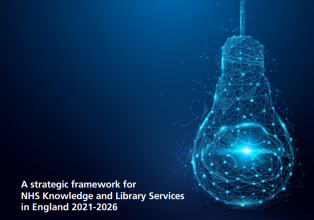Knowledge for Healthcare
Mobilising evidence; sharing knowledge; improving outcomes
Knowledge for Healthcare 2021-2026 sets the strategic direction for the development of NHS knowledge and library services. The priorities are to enable all NHS staff and learners to benefit equally from high-quality knowledge services, and optimise the expertise of knowledge and library teams to inform decision making from Board to ward, at the bedside and in community and primary care.
Health Education England aspires to lead the development of world-class knowledge services, optimising the use of evidence from research and knowledge for policy and practice,
enabling excellent healthcare and health improvement.
Health Education England will work with partners to ensure equity of access and opportunity delivered by:
- The right resources: Commitment to achieving equitable and sustainable funding for NHS knowledge and library services while giving systems value for money.
- The right team with the right roles: Services with more knowledge specialists work with more teams, releasing more time for care, having a greater impact on patient care.
- The right services: Knowledge services for all, built on the principles of equality, diversity and inclusion.
Rob Webster CBE, Chief Executive of South West Yorkshire Partnership NHS Foundation Trust and Lead Chief Executive West Yorkshire and Harrogate ICS:
“Our Library and Knowledge Service enables us to be a learning organisation,
ensuring our staff are well supported to make informed decisions and continue to
drive innovation.”
Our Governance
The Knowledge for Healthcare Board agrees policy and sets strategy and takes oversight of the development of NHS funded library and knowledge services in England in order that they:
- Ensure use of evidence from research across the Service
- Underpin improvements in patient care and safety and outcomes
- Maximise value for money; approve investment decisions
- Enable the development of a flexible NHS workforce that is open to innovation
Strategic Priorities
Mobilising Evidence and Knowledge
Healthcare organisations, services and systems effectively mobilise evidence, learning, knowledge and know-how to enable evidence-based policy and practice
Quality and Impact
Healthcare organisations, staff and learners receive quality assured, business-critical knowledge and library services
Quality improvement outcomes framework
Health Literacy and Patient Information
Staff, learners, patients and the public are better equipped to use evidence-based patient, health and wellbeing information for shared decision-making and self-care
Resource Discovery
Staff and learners make optimal use of high-quality knowledge resources and evidence at the point of need
Workforce Planning and Development
The knowledge and library services workforce has increased capability, confidence and capacity to meet the evolving knowledge and information needs of the healthcare system
Organisations are invited to contact their Senior Library and Knowledge Service Lead for more information.
The Gift of Time
NHS Library and Knowledge Services Value Proposition: The Gift of Time
All healthcare staff are short of an invaluable resource – time. Time to spend caring for their patients while being confident they have the most relevant, evidence-based information they need to plan and deliver that care.
Health Education England (HEE) commissioned the report Library and Knowledge Services Value Proposition: The Gift of Time. This identifies key benefits of a library and knowledge service within an NHS organisation and, specifically, the specialist roles embedded within NHS teams.
Health librarians and knowledge specialists make the gathering of information as easy as possible for healthcare professionals, relieving the burden of sourcing and synthesising evidence while enabling NHS organisations to meet their statutory obligations to get evidence into practice across the service.
Ten Key Messages from the Report
- NHS Library and Knowledge Services operate across a diverse and complex customer base.
- The services provided take the ‘heavy lifting’ out of getting evidence into practice and give the ‘gift of time’ to healthcare professionals.
- Informed decisions improve outcomes, quality of care, patient experience, resource utilisation and operational efficiencies. This is best achieved when healthcare professionals are supported by the right knowledge services, with the right resources and with the right teams and roles.
- When supported by high-performing Library and Knowledge Services, NHS provider organisations are able to demonstrate how they are meeting their statutory obligations to use evidence to inform practice and hence improve their CQC ratings.
- The core Value Proposition is simple: the service provides healthcare professional staff with time-saving accelerated access to better quality evidence which, in turn, enables the NHS to meet its statutory obligations to utilise evidence from research, and, as importantly, for healthcare professionals to use their time more effectively to drive improvements against the quadruple aim
- Case studies of high-performing NHS Library and Knowledge Services demonstrate two key enablers for benefits realisation: they have a clear strategic leadership role in knowledge management and mobilisation and are integrated with service delivery.
- There is a growing and consistent body of robust international evidence to support this value proposition.
- Recently published research from the NHS suggests similar benefits do exist for the NHS.
- Assuming findings from the international literature are applicable to the NHS, the service is potentially already generating an overall economic [not budgetary] benefit of £132m per annum for the NHS, delivering a net economic benefit of £77m per annum. This could increase to £106m per annum were recommended staff ratios for librarians achieved.
- Further high-quality NHS based research will help to quantify the ‘gift of time’ for healthcare professionals and the associated quality improvement benefits for patients, provided by NHS Library and Knowledge Services staff.
